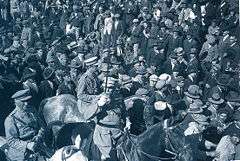28 May 1926 coup d'état
 Gomes da Costa and his troops march victorious into Lisbon on 6 June 1926 | |
| Date | 28 May 1926 |
|---|---|
| Location | Portugal |
| Participants | Portuguese military |
| Outcome |
|
The 28 May 1926 coup d'état, sometimes called 28 May Revolution or, during the period of the authoritarian Estado Novo (English: New State), the National Revolution (Portuguese: Revolução Nacional), was a military coup of a nationalist origin, that put an end to the unstable Portuguese First Republic and initiated the Ditadura Nacional (National Dictatorship), later refashioned into the Estado Novo, an authoritarian dictatorship that would last until the Carnation Revolution in 1974.
The chronic political instability and government's neglect of the army created opportunities for military plots. Already in 1925 there were two failed coup attempts on April 18 and July 19. The plotters were acquitted by military court. During winter of 1925 and spring 1926 a group of junior officers planned a new coup and were looking for a senior officer to be the figurehead of their movement. They decided on General Manuel Gomes da Costa, who agreed to join the plotters on May 25.[1]
The revolution started in Braga, commanded by General Manuel Gomes da Costa, followed immediately in Porto, Lisbon, Évora, Coimbra and Santarém. The revolution triumphed when General Gomes da Costa marched on Lisbon along with 15,000 men, being acclaimed by the people of the city.
Timeline of events
- 27 May
- General Manuel de Oliveira Gomes da Costa arrives at Braga with the purpose of initiating a coup d'état.
- The Republican Government and Prime Minister António Maria da Silva, knowing of the forthcoming coup, tries to organize resistance, believing the uprising can be defeated.
- 28 May
- A military coup d'état (henceforth known as the 28th May 1926 coup d'état) begins in Braga led by Gomes da Costa. Initially believing that he has failed, Gomes da Costa announces his surrender.
- 29 May
- The Portuguese Communist Party interrupts its 2nd Congress due to the political and military situation.
- The Confederação Geral do Trabalho (General Confederation of Labour) declares its neutrality in the military confrontations.
- The military coup spreads to the rest of the country, by influence of Mendes Cabeçadas, Sinel de Cordes and Óscar Carmona, and establishes the Ditadura Nacional (National Dictatorship) against the democratic but unstable 1st Republic.
- The Government of Prime Minister António Maria da Silva resigns.
- 30 May
- The General Gomes da Costa is acclaimed in Porto.
- The President of the Republic, Bernardino Machado, resigns.
- José Mendes Cabeçadas Júnior becomes Prime Minister and President of the Republic.
- 3 June: António de Oliveira Salazar becomes Minister of Finance, but resigns 16 days after nomination.
- 3 June: The Congress of the Republic of Portugal (National Assembly) is dissolved by dictatorial decree.
- All heads of Municipalities are substituted.
- The Carbonária is banned.
- All Political parties are banned.
- 17 June: General Gomes da Costa provokes a military coup.
- 19 June: General Gomes da Costa becomes Prime Minister.
- 22 June: Censorship is instituted.
- 29 June: General Gomes da Costa becomes President of the Republic.
- 9 July
- General Gomes da Costa is obliged to step down and goes into exile.
- General António Óscar de Fragoso Carmona, of the conservative military wing, becomes Prime Minister.
- 15 September: Failed military coup.
- 18 September: Failed military coup.
- 29 November: General António Óscar Carmona becomes President of the Republic.
- 16 December: The Police of Information of Lisbon, a political police force, is created.
References
- ↑ Tom Gallagher, Portugal: A Twentieth-century Interpretation, 1983, p. 62.